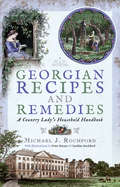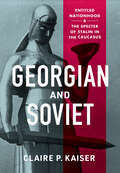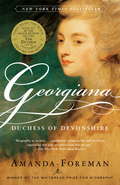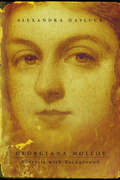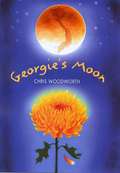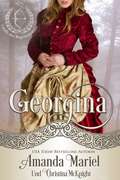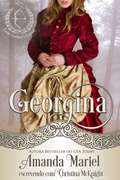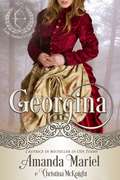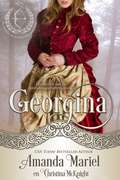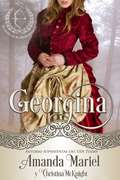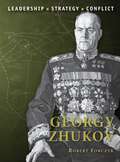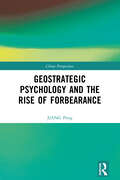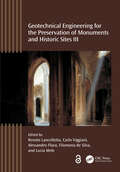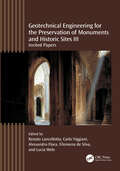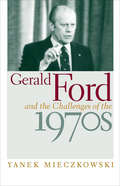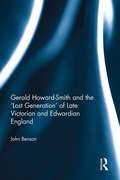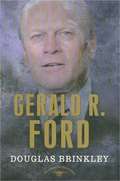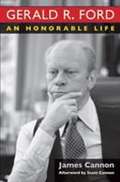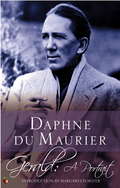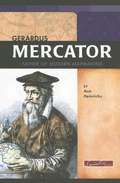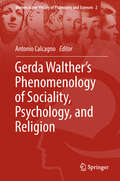- Table View
- List View
Georgian Recipes and Remedies: A Country Lady's Household Handbook
by Michael J. Rochford&“A brilliant collection of recipes, receipts, restoratives and remarkable cures from the Georgian era . . . a joy to read out to your friends and family.&” —Books Monthly Discover the recipes for Mrs. Rooke&’s Very Good Plum Cake and Lady Harbord&’s Marigold Cheese. Learn how to preserve gooseberries &“as green as they grow&” and make Sir Theodore Colladon&’s Peach Flower Syrup. Feast on Lady St. Quintin&’s Dutch Pudding and Mrs. Eall&’s Candied Cowslips. Then wash it all down with Lady Strickland&’s Strong Mead or some Right Red Dutch Currant Wine. These are just some of the delightful Georgian recipes found in the receipt books of Sabine Winn, the eighteenth-century Swiss-born wife of Sir Rowland Winn, 5th Baronet Nostell of the impressive Palladian mansion, Nostell Priory in Yorkshire. Using centuries-old cookbooks, newspaper clippings, old family recipes and contributions from noble friends, Lady Winn created a wonderfully eclectic collection of mouthwatering dishes that are presented in this new volume for modern readers to enjoy. Mistrustful of English doctors, Sabine&’s receipt books also contain scores of remedies for a whole series of complaints, such as: The Best Thing in the World for Languishing Spirits or Fatigue after a Journey; Mrs Aylott&’s Excellent Remedy for Colic; Aunt Barrington&’s Cure for Pleurisy; An Approved Medicine to Drive the Scurvy or any other Ill Humour out of a Man&’s Body; and A Diet Drink to Cure all Manner of Hurts and Wounds.&“I found the herbal use in the recipes intriguing, creative, and sometimes delightfully odd . . . provides an interesting slice of 18th century Georgian life in England.&” —American Herb Association Quarterly
Georgian Recipes and Remedies: A Country Lady's Household Handbook
by Michael J. Rochford&“A brilliant collection of recipes, receipts, restoratives and remarkable cures from the Georgian era . . . a joy to read out to your friends and family.&” —Books Monthly Discover the recipes for Mrs. Rooke&’s Very Good Plum Cake and Lady Harbord&’s Marigold Cheese. Learn how to preserve gooseberries &“as green as they grow&” and make Sir Theodore Colladon&’s Peach Flower Syrup. Feast on Lady St. Quintin&’s Dutch Pudding and Mrs. Eall&’s Candied Cowslips. Then wash it all down with Lady Strickland&’s Strong Mead or some Right Red Dutch Currant Wine. These are just some of the delightful Georgian recipes found in the receipt books of Sabine Winn, the eighteenth-century Swiss-born wife of Sir Rowland Winn, 5th Baronet Nostell of the impressive Palladian mansion, Nostell Priory in Yorkshire. Using centuries-old cookbooks, newspaper clippings, old family recipes and contributions from noble friends, Lady Winn created a wonderfully eclectic collection of mouthwatering dishes that are presented in this new volume for modern readers to enjoy. Mistrustful of English doctors, Sabine&’s receipt books also contain scores of remedies for a whole series of complaints, such as: The Best Thing in the World for Languishing Spirits or Fatigue after a Journey; Mrs Aylott&’s Excellent Remedy for Colic; Aunt Barrington&’s Cure for Pleurisy; An Approved Medicine to Drive the Scurvy or any other Ill Humour out of a Man&’s Body; and A Diet Drink to Cure all Manner of Hurts and Wounds.&“I found the herbal use in the recipes intriguing, creative, and sometimes delightfully odd . . . provides an interesting slice of 18th century Georgian life in England.&” —American Herb Association Quarterly
Georgian and Soviet: Entitled Nationhood and the Specter of Stalin in the Caucasus
by Claire P. KaiserGeorgian and Soviet investigates the constitutive capacity of Soviet nationhood and empire. The Soviet republic of Georgia, located in the mountainous Caucasus region, received the same nation-building template as other national republics of the USSR. Yet Stalin's Georgian heritage, intimate knowledge of Caucasian affairs, and personal involvement in local matters as he ascended to prominence left his homeland to confront a distinct set of challenges after his death in 1953.Utilizing Georgian archives and Georgian-language sources, Claire P. Kaiser argues that the postwar and post-Stalin era was decisive in the creation of a "Georgian" Georgia. This was due not only to the peculiar role played by the Stalin cult in the construction of modern Georgian nationhood but also to the subsequent changes that de-Stalinization wrought among Georgia's populace and in the unusual imperial relationship between Moscow and Tbilisi. Kaiser describes how the Soviet empire could be repressive yet also encourage opportunities for advancement—for individual careers as well as for certain nationalities. The creation of national hierarchies of entitlement could be as much about local and republic-level imperial imaginations as those of a Moscow center.Georgian and Soviet reveals that the entitled, republic-level national hierarchies that the Soviet Union created laid a foundation for the claims of nationalizing states that would emerge from the empire's wake in 1991. Today, Georgia still grapples with the legacies of its Soviet century, and the Stalin factor likewise lingers as new generations of Georgians reevaluate the symbiotic relationship between Soso Jughashvili and his native land.
Georgiana
by Amanda ForemanThe winner of Britain's prestigious Whitbread Prize and a bestseller there for months, this wonderfully readable biography offers a rich, rollicking picture of late-eighteenth-century British aristocracy and the intimate story of a woman who for a time was its undisputed leader.Lady Georgiana Spencer was the great-great-great-great-aunt of Diana, Princess of Wales, and was nearly as famous in her day. In 1774, at the age of seventeen, Georgiana achieved immediate celebrity by marrying one of England's richest and most influential aristocrats, the Duke of Devonshire. Launched into a world of wealth and power, she quickly became the queen of fashionable society, adored by the Prince of Wales, a dear friend of Marie-Antoinette, and leader of the most important salon of her time. Not content with the role of society hostess, she used her connections to enter politics, eventually becoming more influential than most of the men who held office. Her good works and social exploits made her loved by the multitudes, but Georgiana's public success, like Diana's, concealed a personal life that was fraught with suffering. The Duke of Devonshire was unimpressed by his wife's legendary charms, preferring instead those of her closest friend, a woman with whom Georgiana herself was rumored to be on intimate terms. For over twenty years, the three lived together in a jealous and uneasy ménage à trois, during which time both women bore the Duke's children--as well as those of other men.Foreman's descriptions of Georgiana's uncontrollable gambling, all- night drinking, drug taking, and love affairs with the leading politicians of the day give us fascinating insight into the lives of the British aristocracy in the era of the madness of King George III, the American and French revolutions, and the defeat of Napoleon. A gifted young historian whom critics are already likening to Antonia Fraser, Amanda Foreman draws on a wealth of fresh research and writes colorfully and penetratingly about the fascinating Georgiana, whose struggle against her own weaknesses, whose great beauty and flamboyance, and whose determination to play a part in the affairs of the world make her a vibrant, astonishingly contemporary figure.
Georgiana Molloy: Portrait with Background
by Alexandra HasluckThe story of a remarkable pioneer who discovered in the strange colonial wilderness the splendour and richness of Australia's unique flora. In 1829 Georgiana Molloy moved from the middle-class comfort of the English border country to an isolated wilderness on the opposite side of the world. The young bride and her husband, Captain John Molloy, were among a small party that founded the settlement of Augusta on Western Australia's south-west coast. A pioneer of great courage and capacity, Georgiana was presented with seemingly overwhelming trials and hardships. But she was a woman who was never defeated by circumstance, and never ceased to find enjoyment and satisfaction in her life. One of her enduring legacies is her study and identification of much of the unique local flora. A vivid portrait of an extraordinary woman.
Georgie's Moon
by Chris WoodworthGeorgie Collins knows exactly how to make it through life in a new town. Before her father left for Vietnam, he gave her standing orders never to let anyone mess with her, and she won't. As long as she doesn't allow the enemy to smell her fear, Georgie will survive seventh grade in Glendale, Indiana, just fine. But that doesn't mean she'll like it. How could she? Her school has forced her to participate in a "Good Deeds Program," so she's stuck visiting old people in a nursing home.What's more, her classes are filled with "peacenik" kids who think the war is wrong - including her only friend. At home,it seems that the kids her mom is babysitting are constantly whining at her. Worst of all, Georgie's father has been gone a long time - and even though he promised to send her his love every night on the moon, sometimes that's not enough. This story of a feisty girl's fierce devotion to her father is a powerful reflection on the ravages of war.
Georgina
by Amanda Mariel Christina BergmannEine starke junge Frau … Lady Georgina Setons Zukunftspläne sind wie sie – wild und verwegen. Der Liebeskummer ihrer Vergangenheit treibt sie an. Denn sie will ihr Ziel um jeden Preis erreichen … und ihr Schicksal selbst in die Hand nehmen. Kann sie sich als beste Bogenschützin Englands beweisen und so ihre Zukunft als unabhängige Frau sichern? Ein ehrgeiziger Mann … Er ist zwar nur der zweitgeborene Sohn des Viscounts, doch das hält Felton Crauford nicht davon ab, seine eigene Zukunft zu planen und Reichtum zu erarbeiten. Zunächst scheint ihm das Glück hold, als er ein reiches Mineralvorkommen entdeckt. Doch die Ader verläuft von seinem auf ein benachbartes Grundstück. Zu seinem Ärger kommt ihm der dort lebende Wildfang immer wieder in die Quere. Zu allem Überfluss ist aus dem kleinen nervigen Mädchen nun eine wunderschöne Frau geworden, deren Reize er nicht ignorieren kann. Felton und Georgina kämpfen beide gegen ein unbezwingbares Verlangen an. Ihm nachzugeben würde ihrer beide Pläne zunichtemachen. Dennoch sind sie hilflos ihren Gefühlen füreinander ausgeliefert. Georgina muss sich entscheiden: Verschenkt sie ihr Herz noch ein weiteres Mal oder wird sie alles verlieren?
Georgina (Lady Archer's Creed Ser.)
by Éli Assunção Amanda MarielUma mulher determinada… Selvagem e irresponsável, Lady Georgina Seton tem planos para o seu futuro. Conduzida pela dor de um coração partido, fará o que quer que seja necessário para atingir seus objetivos… e ela está determinada a controlar o próprio destino. Ao se tornar a melhor arqueira que a Inglaterra já viu, conseguirá garantir seu futuro sem ter que se casar. Um homem ambicioso... Nascido sobressalente, Felton Crauford está inclinado a garantir o seu futuro acumulando riquezas. O veio mineral que descobre prometeu ser uma bênção, mas há um problema... a reserva segue para a propriedade vizinha. Para seu desespero, a moleca que mora ao lado faz qualquer coisa que pode para se meter em seu caminho. Tudo isso enquanto se prova uma tentação que ele não pode simplesmente ignorar. Felton e Georgina são apanhados em um anseio incontrolável que ameaça destruir os planos de ambos. Pior, eles são incapazes de controlar o desejo que arde entre eles. Georgina deve fazer suas apostas: Abrir seu coração uma vez mais ou se arriscar a perder tudo.
Georgina (Lady Archer's Creed Ser.)
by Amanda Mariel Genna DichiaraGeorgina di Amanda Mariel Georgina deve fare la sua scommessa: aprire di nuovo il suo cuore o rischiare di perdere tutto. Una donna determinata... Spericolata e senza freni, Lady Georgina Seton ha un piano per il suo futuro. Mossa dal dolore di una delusione d'amore farà qualunque cosa per ottenere ciò che vuole... ed è decisa a prendere il controllo del suo destino. Diventando la migliore tiratrice con l'arco che l'Inghilterra abbia mai avuto si garantirà un futuro senza bisogno di sposarsi. Un uomo ambizioso... Nato libero, Felton Crauford è più che deciso ad assicurarsi il futuro accumulando ricchezza. Il giacimento minerario che ha scoperto promette di dargliene molta ma c'è un problema... si trova nella tenuta dei vicini. Per sua sfortuna, il maschiaccio della porta accanto fa di tutto per mettergli i bastoni tra le ruote oltre a rappresentare una tentazione a cui non riesce a resistere. Felton e Georgina sono intrappolati da un desiderio irrefrenabile che minaccia di distruggere i progetti di entrambi e quel che è peggio, sono incapaci di fermare la fiamma incandescente che arde tra di loro. Georgina deve fare la sua scommessa: aprire di nuovo il suo cuore o rischiare di perdere tutto. Genere: narrativa / sentimentale / storico Sottogenere: narrativa / sentimentale / nobiltà Lingua: italiano Parole chiave: storico sentimentale, vittoriano, nobiltà, saga, storico Parole: 30000 Informazioni di vendita Georgina è uscito il 18 aprile ed è subito andato dritto nella lista dei bestseller in dieci categorie storiche. Le vendite sono rimaste alte e stabili in tutti i canali di distribuzione e le recensioni sono ottime.
Georgina - De erecode van de damesboogschutters, boek 2
by Amanda MarielGeorgina staat voor de uitdaging van haar leven: opnieuw haar hart openen of alles kwijt raken. Een vastbesloten vrouw… Lady Georgina Seton, wild en roekeloos, heeft zo haar eigen toekomstplannen. De pijn van een gebroken hart maakt dat ze bereid is alles te doen om te krijgen wat ze wil. Ze is vastbesloten haar lot in eigen hand te nemen. Door Engelands beste boogschutter aller tijden te worden wil ze haar toekomst zeker stellen zonder te hoeven trouwen. Een ambitieuze man… Als tweede zoon van een burggraaf is Felton Crauford erop gebeten zijn eigen toekomst zeker te stellen door zijn fortuin te vergroten. De ertslaag die hij ontdekt, blijkt veel op te leveren maar er is een probleem… de laag loopt door op het naburige landgoed. Tot zijn grote ongenoegen doet de wildebras die daar woont er alles aan om hem voor de voeten te lopen. Terwijl ze hem tegelijkertijd in verleiding brengt op een manier die hij niet kan negeren. Felton en Georgina zitten gevangen in een onbedwingbaar verlangen naar elkaar dat dreigt hun plannen om zeep te helpen. Erger nog, ze zijn niet in staat een einde te maken aan het brandende vuur dat telkens weer tussen hen oplaait. Georgina staat voor de uitdaging van haar leven: haar hart openen of alles kwijtraken.
Georgina, segundo libro de la serie El credo de la dama arquera
by Lola Fortuna Amanda MarielUna mujer decidida… Rebelde e inquieta. Lady Georgina Seton tiene planes para su futuro. Movida por el dolor de su corazón herido, hará lo que haga falta para obtener lo que desea… Tiene la determinacion de controlar su destino convirtiéndose en la mejor tiradora con arco que Inglaterra haya visto jamás, así tendrá su futuro asegurado sin tener que casarse. Un hombre ambicioso… Nacido como el segundón. Felton Crauford se deja cuerpo y alma para asegurar su futuro amasando una fortuna. La veta mineral que ha descubierto promete ser maravillosa, pero hay un problema… el depósito se adentra en las tierras del vecino. Para su furia, la fierecilla de su vecina no para de causarle problemas, además de ser una tentación que él no puede ignorar. Felton y Georgina se encuentran atrapados en una red de anhelos imparable que amenaza con destruir sus planes. Lo que es peor, no son capaces de contener el ardiente deseo que se desata entre los dos. Georgina tiene que escoger: abrir su corazón una vez más o arriesgarse a perderlo todo.
Georgy Zhukov
by Robert Forczyk Adam HookZhukov was the dominant figure in the Red Army during World War II even though his actual job title varied from day to day. Serving as a senior General Staff representative from the Stavka, Zhukov moved from one critical sector to the next, serving as advisor, coordinator and de facto front commander as required. There is no doubt that Zhukov played a critical role in salvaging the critical situation in the fall of 1941 and leading the Red Army to an amazing reversal of fortunes in 1942-43 and eventual victory in 1944-45. He was instrumental in the initial defence of Leningrad, before moving to Moscow to stem the German advance and lead the counterattack in the winter of 1941. In 1942-43 he was responsible for Operation Uranus that cut off the German 6. Armee in Stalingrad, and led the defence of the Kursk Pocket against Manstein's attacks. His was the voice of reason and patience that convinced Stalin to let the Germans expend themselves at Kursk before launching the Soviet offensive that drove the Germans back hundreds of miles and almost broke the German Army inthe Ukraine. Without him Kursk would never have been fought as a defensive battle by the Russians. In 1944 he led the massive Soviet Operation Bagration that destroyed the German Heeresgruppe Mitte and continued on in command of front through to the end of the war, which saw him become the first post-war Soviet commander in East Germany.However, Zhukov's methods were brutal and contributed to massive Soviet casualties, while he continued to keep his hand in political affairs as well. As the most recognized Soviet soldier of World War II, Zhukov's post-war fall from grace was equally precipitous and it was not until the fall of the Soviet Union that he was awarded his reputation was restored.
Geostrategic Psychology and the Rise of Forbearance (China Perspectives)
by JIANG PengBased on the framework of geostrategic psychology, this book elucidates the intrinsic law of the rise and fall of great powers and gives insights into the quandary of China's rise and the mechanism behind the strategy.Conflating geopolitics and strategic psychology, geostrategic psychology is rooted in the historical study of strategy and premised on an assumption that human beings bear resemblance in psychology and behavior when facing the same structure of geopolitical circumstance. The book analyzes intriguing phenomena from strategic psychology, including trend anxiety and conflict willingness, the Old Man Phenomenon in international politics, the Santa Claus Effect, the Myth of the Sunk Cost Fallacy, Bidder Myth, Gambler's Game, Philip Trap, William's Dilemma, Heartland Myth, Domino's Fear, Golden Nation Myth, Alliance Commitment Dilemma and Corinthian Dilemma among others. The author combines theory, history and the practice of international politics, revealing how a nation can occupy a favorable position in the field of global strategic competition and prospects for China.The title will be a valuable reference for observers of international politics as well as researchers and students interested in international relations, international politics, geopolitics, strategic psychology and geostrategic psychology.
Geotechnical Engineering for the Preservation of Monuments and Historic Sites III: Invited Papers
by Renato LancellottaThe conservation of monuments and historic sites is one of the most challenging problems facing modern civilization. It involves, in inextricable patterns, factors belonging to different fields (cultural, humanistic, social, technical, economical, administrative) and the requirements of safety and use appear to be (or often are) in conflict with the respect of the integrity of the monuments. The complexity of the topic is such that a shared framework of reference is still lacking among art historians, architects, structural and geotechnical engineers. The complexity of the subject is such that a shared frame of reference is still lacking among art historians, architects, architectural and geotechnical engineers. And while there are exemplary cases of an integral approach to each building element with its static and architectural function, as a material witness to the culture and construction techniques of the original historical period, there are still examples of uncritical reliance on modern technology leading to the substitution from earlier structures to new ones, preserving only the iconic look of the original monument. Geotechnical Engineering for the Preservation of Monuments and Historic Sites III collects the contributions to the eponymous 3rd International ISSMGE TC301 Symposium (Naples, Italy, 22-24 June 2022). The papers cover a wide range of topics, which include: - Principles of conservation, maintenance strategies, case histories - The knowledge: investigations and monitoring - Seismic risk, site effects, soil structure interaction - Effects of urban development and tunnelling on built heritage - Preservation of diffuse heritage: soil instability, subsidence, environmental damages The present volume aims at geotechnical engineers and academics involved in the preservation of monuments and historic sites worldwide.
Geotechnical Engineering for the Preservation of Monuments and Historic Sites III: Invited papers
by Renato LancellottaThis book contains the invited lectures presented at the 3th International Symposium on Geotechnical Engineering for the Preservation of Monuments and Historic Sites (IS NAPOLI 2022, Naples, Italy, 22-24 June 2022). It collects the opening address, the third Kerisel Lecture, four keynote lectures and eleven panel lectures, and provides a broad impression of 1. the current state of knowledge and 2. the techniques used worldwide for the preservation of built heritage. When confronted with structures relevant to local and global history, there is only one way to select the best possible conservation solution: the multidisciplinary approach. Therefore, the invited speakers have been selected with different pertinent skills, to represent this complexity from the points of view of geotechnical engineers, structural engineers, architects and conservation experts. The book will be useful to researchers, practitioners, administrations and all those working or interested in the preservation of built heritage.
Gerald Ford and the Challenges of the 1970s
by Yanek MieczkowskiA reappraisal of the brief presidency of Gerald Ford, called to leadership in the midst of scandal, stagflation, and an energy crisis. For many Americans, Gerald Ford evokes an image of either an unelected president who abruptly pardoned his corrupt predecessor or an accident-prone klutz spoofed on Saturday Night Live. In this book, Yanek Mieczkowski reexamines Ford&’s two and a half years in office, showing that his presidency successfully confronted the most vexing crisis of the postwar era. Viewing the 1970s primarily through the lens of economic events, Mieczkowski argues that Ford&’s understanding of the national economy was better than any modern president&’s; that he oversaw a dramatic reduction of inflation; and that he attempted to solve the energy crisis with judicious policies. Throughout his presidency, Ford labored under the legacy of Watergate. Democrats scored landslide victories in the 1974 midterm elections, and within an anemic Republican Party, the right wing challenged Ford&’s leadership, even as pundits predicted the GOP&’s death. Yet Ford reinvigorated the party and fashioned a 1976 campaign strategy against Jimmy Carter that brought him from thirty points behind to a dead heat on election day. Drawing on numerous personal interviews with former President Ford, cabinet officials, and members of the Ninety-fourth Congress, Mieczkowski presents the first major work on Ford in more than a decade, combining the best of biography and presidential history to paint an intriguing portrait of a president, his times, and his legacy. &“This ambitious work calls for a reexamination of the Ford presidency in light of the formidable challenges he faced upon taking office. A welcome and important addition to the literature on the Ford presidency.&” ―Library Journal
Gerald Howard-Smith and the ‘Lost Generation’ of Late Victorian and Edwardian England
by John BensonGerald Howard-Smith’s life is intriguing both in its own right and as a vehicle for exploring the world in which he lived. Tall, boisterous and sometimes rather irascible, he was one of the so-called ‘Lost Generation’ whose lives were cut short by the First World War. Brought up in London, and educated at Eton and Cambridge, he excelled both at cricket and athletics. After qualifying as a solicitor he moved to Wolverhampton and threw himself into the local sporting scene, making a considerable name for himself in the years before the First World War. Volunteering for military service in 1914, he was decorated for bravery before being killed in action two years later. Reporting his death, the War History of the South Staffordshire Regiment claimed that, ‘In his men’s eyes he lived as a loose-limbed hero, and in him they lost a very humorous and a very gallant gentleman.’ As well as telling the fascinating story of Gerald Howard-Smith for the first time, this important new biography explores such complex and important issues as childhood and adolescence, class relations, sporting achievement, manliness and masculinity, metropolitan-provincial relationships, and forms of commemoration. It will therefore be of interest to educationalists, sports historians, local and regional historians, and those interested in class, gender and civilian-military relations – indeed all those seeking to understand the economic, social, and cultural life of late nineteenth and early twentieth-century Britain.
Gerald R. Ford (The American Presidents Series)
by Arthur M. Schlesinger Douglas G. BrinkleyThe 'accidental' president whose innate decency and steady hand restored the presidency after its greatest crisis. When Gerald R. Ford entered the White House in August 1974, he inherited a presidency tarnished by the Watergate scandal, the economy was in a recession, the Vietnam War was drawing to a close, and he had taken office without having been elected. Most observers gave him little chance of success, especially after he pardoned Richard Nixon just a month into his presidency, an action that outraged many Americans, but which Ford thought was necessary to move the nation forward. Many people today think of Ford as a man who stumbled a lot--clumsy on his feet and in politics--but acclaimed historian Douglas Brinkley shows him to be a man of independent thought and conscience, who never allowed party loyalty to prevail over his sense of right and wrong. As a young congressman, he stood up to the isolationists in the Republican leadership, promoting a vigorous role for America in the world. Later, as House minority leader and as president, he challenged the right wing of his party, refusing to bend to their vision of confrontation with the Communist world. And after the fall of Saigon, Ford also overruled his advisers by allowing Vietnamese refugees to enter the United States, arguing that to do so was the humane thing to do. Brinkley draws on exclusive interviews with Ford and on previously unpublished documents (including a remarkable correspondence between Ford and Nixon stretching over four decades), fashioning a masterful reassessment of Gerald R. Ford's presidency and his under-appreciated legacy to the nation.
Gerald R. Ford: An Honorable Life
by James Scott Cannon“Not since Harry Truman succeeded Franklin D. Roosevelt twenty-nine years earlier had the American people known so little about a man who had stepped forward from obscurity to take the oath of office as President of the United States. ” —from Chapter 4 This is a comprehensive narrative account of the life of Gerald Ford written by one of his closest advisers, James Cannon. Written with unique insight and benefiting from personal interviews with President Ford in his last years, Gerald R. Ford: An Honorable Life is James Cannon’s final look at the simple and honest man from the Midwest.
Gerald: A Portrait (Virago Modern Classics #113)
by Daphne Du MaurierFROM THE BESTSELLING AUTHOR OF REBECCASir Gerald du Maurier was the most celebrated actor-manager of his day, knighted for his services to the theatre in 1922, and the father to one of the most enduring writers of the twentieth century. Published within six months of her father's death, this frank biography was considered shocking by many of his admirers - but it was a huge success, winning Daphne du Maurier critical acclaim and launching her career.In Gerald: A Portrait, Daphne du Maurier captures the spirit and charm of the charismatic actor who played the original Captain Hook, amusingly recalling his eccentricities and his sense of humour, and sensitively portraying the darker side of his nature and his bouts of depression.A remarkable book . . . brilliant comic writing - The Times
Gerald: A Portrait (Vmc Ser. #654)
by Daphne Du MaurierFROM THE BESTSELLING AUTHOR OF REBECCASir Gerald du Maurier was the most celebrated actor-manager of his day, knighted for his services to the theatre in 1922, and the father to one of the most enduring writers of the twentieth century. Published within six months of her father's death, this frank biography was considered shocking by many of his admirers - but it was a huge success, winning Daphne du Maurier critical acclaim and launching her career.In Gerald: A Portrait, Daphne du Maurier captures the spirit and charm of the charismatic actor who played the original Captain Hook, amusingly recalling his eccentricities and his sense of humour, and sensitively portraying the darker side of his nature and his bouts of depression.A remarkable book . . . brilliant comic writing - The Times
Gerardus Mercator: Father of Modern Mapmaking
by Ann HeinrichsMercator was destined to be one of the most famous mapmakers in history. Before his time, many maps were as much about myths as geographical reality, filled with exotic creatures and fabled lands. But he turned cartography, or map-making, into a science. He based his maps on firsthand reports, using mathematical calculations whenever possible to pinpoint locations.
Gerda Walther’s Phenomenology of Sociality, Psychology, and Religion (Women in the History of Philosophy and Sciences #2)
by Antonio CalcagnoThis book explores the philosophical writings of Gerda Walther (1897–1977). It features essays thatrecover large parts of Walther’s oeuvre in order to show her contribution to phenomenologyand philosophy. In addition, the volume contains an English translation of part of hermajor work on mysticism.The essays consider the interdisciplinary implications of Gerda Walther’s ideas. A student of Edmund Husserl, Edith Stein, and Alexander Pfänder, she wrotefoundational studies on the ego, community, mysticism and religion, and consciousness.Her discussions of empathy, identification, the ego and ego-consciousness,alterity, God, mysticism, sensation, intentionality, sociality, politics, and woman arerelevant not only to phenomenology and philosophy but also to scholars of religion, women’s and gender studies, sociology, political science, and psychology.Gerda Walther was one of the important figures of the early phenomenologicalmovement. However, as a woman, she could not habilitate at a Germanuniversity and was, therefore, denied a position. Her complete works have yet to bepublished. This ground-breaking volume not only helps readers discover a vital voice but it also demonstrates the significant contributions of women to early phenomenological thinking.
Gerda's Lawman
by Lena Nelson Dooley"He was coming down the stairs in the hotel lobby while we were waiting for Gustaf and Olina to arrive. I glanced up," Gerda said as a blush moved up her cheeks, "and when our eyes met, it was as if everything within me connected with everything in him. I don't know how to explain it. For a moment, I felt as if we were the only two people in the room." Anna looked as if she were holding back a chuckle. "That's interesting." Gerda got up and walked to the window nearest the sewing machine. She held back the curtain and gazed at nothing in particular. "Don't you see? All these years I've waited for God to bring me someone to love, and the only person I've felt anything special for is a man who isn't a Christian. I've been praying for God to take the temptation from me. I just can't get too close to him, because..." After a moment, Anna asked, "Because what?" Gerda turned away and crossed her arms. "I'm afraid I could fall in love with him very easily. I can't risk that."
